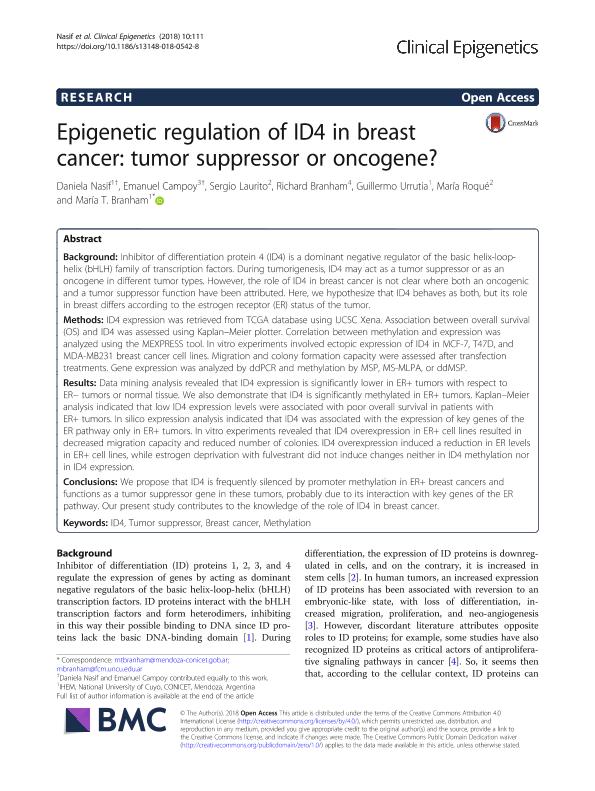Mostrar el registro sencillo del ítem
dc.contributor.author
Nasif, Daniela Lucía

dc.contributor.author
Campoy, Emanuel Martin

dc.contributor.author
Laurito, Sergio Roberto

dc.contributor.author
Branham, Richard Lacy

dc.contributor.author
Urrutia, Guillermo Alejandro

dc.contributor.author
Roque Moreno, Maria

dc.contributor.author
Branham, Maria Teresita

dc.date.available
2020-01-06T18:46:01Z
dc.date.issued
2018-08
dc.identifier.citation
Nasif, Daniela Lucía; Campoy, Emanuel Martin; Laurito, Sergio Roberto; Branham, Richard Lacy; Urrutia, Guillermo Alejandro; et al.; Epigenetic regulation of ID4 in breast cancer: Tumor suppressor or oncogene?; BioMed Central; Clinical Epigenetics; 10; 1; 8-2018
dc.identifier.issn
1868-7083
dc.identifier.uri
http://hdl.handle.net/11336/93662
dc.description.abstract
Background: Inhibitor of differentiation protein 4 (ID4) is a dominant negative regulator of the basic helix-loop-helix (bHLH) family of transcription factors. During tumorigenesis, ID4 may act as a tumor suppressor or as an oncogene in different tumor types. However, the role of ID4 in breast cancer is not clear where both an oncogenic and a tumor suppressor function have been attributed. Here, we hypothesize that ID4 behaves as both, but its role in breast differs according to the estrogen receptor (ER) status of the tumor. Methods: ID4 expression was retrieved from TCGA database using UCSC Xena. Association between overall survival (OS) and ID4 was assessed using Kaplan-Meier plotter. Correlation between methylation and expression was analyzed using the MEXPRESS tool. In vitro experiments involved ectopic expression of ID4 in MCF-7, T47D, and MDA-MB231 breast cancer cell lines. Migration and colony formation capacity were assessed after transfection treatments. Gene expression was analyzed by ddPCR and methylation by MSP, MS-MLPA, or ddMSP. Results: Data mining analysis revealed that ID4 expression is significantly lower in ER+ tumors with respect to ER- tumors or normal tissue. We also demonstrate that ID4 is significantly methylated in ER+ tumors. Kaplan-Meier analysis indicated that low ID4 expression levels were associated with poor overall survival in patients with ER+ tumors. In silico expression analysis indicated that ID4 was associated with the expression of key genes of the ER pathway only in ER+ tumors. In vitro experiments revealed that ID4 overexpression in ER+ cell lines resulted in decreased migration capacity and reduced number of colonies. ID4 overexpression induced a reduction in ER levels in ER+ cell lines, while estrogen deprivation with fulvestrant did not induce changes neither in ID4 methylation nor in ID4 expression. Conclusions: We propose that ID4 is frequently silenced by promoter methylation in ER+ breast cancers and functions as a tumor suppressor gene in these tumors, probably due to its interaction with key genes of the ER pathway. Our present study contributes to the knowledge of the role of ID4 in breast cancer.
dc.format
application/pdf
dc.language.iso
eng
dc.publisher
BioMed Central

dc.rights
info:eu-repo/semantics/openAccess
dc.rights.uri
https://creativecommons.org/licenses/by-nc-sa/2.5/ar/
dc.subject
BREAST CANCER
dc.subject
ID4
dc.subject
METHYLATION
dc.subject
TUMOR SUPPRESSOR
dc.subject.classification
Bioquímica y Biología Molecular

dc.subject.classification
Medicina Básica

dc.subject.classification
CIENCIAS MÉDICAS Y DE LA SALUD

dc.title
Epigenetic regulation of ID4 in breast cancer: Tumor suppressor or oncogene?
dc.type
info:eu-repo/semantics/article
dc.type
info:ar-repo/semantics/artículo
dc.type
info:eu-repo/semantics/publishedVersion
dc.date.updated
2019-10-23T19:29:54Z
dc.journal.volume
10
dc.journal.number
1
dc.journal.pais
Estados Unidos

dc.description.fil
Fil: Nasif, Daniela Lucía. Consejo Nacional de Investigaciones Científicas y Técnicas. Centro Científico Tecnológico Conicet - Mendoza. Instituto de Histología y Embriología de Mendoza Dr. Mario H. Burgos. Universidad Nacional de Cuyo; Argentina
dc.description.fil
Fil: Campoy, Emanuel Martin. Consejo Nacional de Investigaciones Científicas y Técnicas. Centro Científico Tecnológico Conicet - Mendoza. Instituto de Histología y Embriología de Mendoza Dr. Mario H. Burgos. Universidad Nacional de Cuyo; Argentina
dc.description.fil
Fil: Laurito, Sergio Roberto. Consejo Nacional de Investigaciones Científicas y Técnicas. Centro Científico Tecnológico Conicet - Mendoza. Instituto de Histología y Embriología de Mendoza Dr. Mario H. Burgos. Universidad Nacional de Cuyo; Argentina
dc.description.fil
Fil: Branham, Richard Lacy. Consejo Nacional de Investigaciones Científicas y Técnicas; Argentina
dc.description.fil
Fil: Urrutia, Guillermo Alejandro. Instituto de Histología y Embriología de Mendoza Dr. Mario H. Burgos. Universidad Nacional de Cuyo; Argentina
dc.description.fil
Fil: Roque Moreno, Maria. Consejo Nacional de Investigaciones Científicas y Técnicas. Centro Científico Tecnológico Conicet - Mendoza. Instituto de Histología y Embriología de Mendoza Dr. Mario H. Burgos. Universidad Nacional de Cuyo; Argentina
dc.description.fil
Fil: Branham, Maria Teresita. Consejo Nacional de Investigaciones Científicas y Técnicas. Centro Científico Tecnológico Conicet - Mendoza. Instituto de Histología y Embriología de Mendoza Dr. Mario H. Burgos. Universidad Nacional de Cuyo; Argentina
dc.journal.title
Clinical Epigenetics
dc.relation.alternativeid
info:eu-repo/semantics/altIdentifier/url/https://www.ncbi.nlm.nih.gov/pmc/articles/PMC6108146/
dc.relation.alternativeid
info:eu-repo/semantics/altIdentifier/doi/http://dx.doi.org/10.1186/s13148-018-0542-8
dc.relation.alternativeid
info:eu-repo/semantics/altIdentifier/url/https://clinicalepigeneticsjournal.biomedcentral.com/articles/10.1186/s13148-018-0542-8
Archivos asociados
